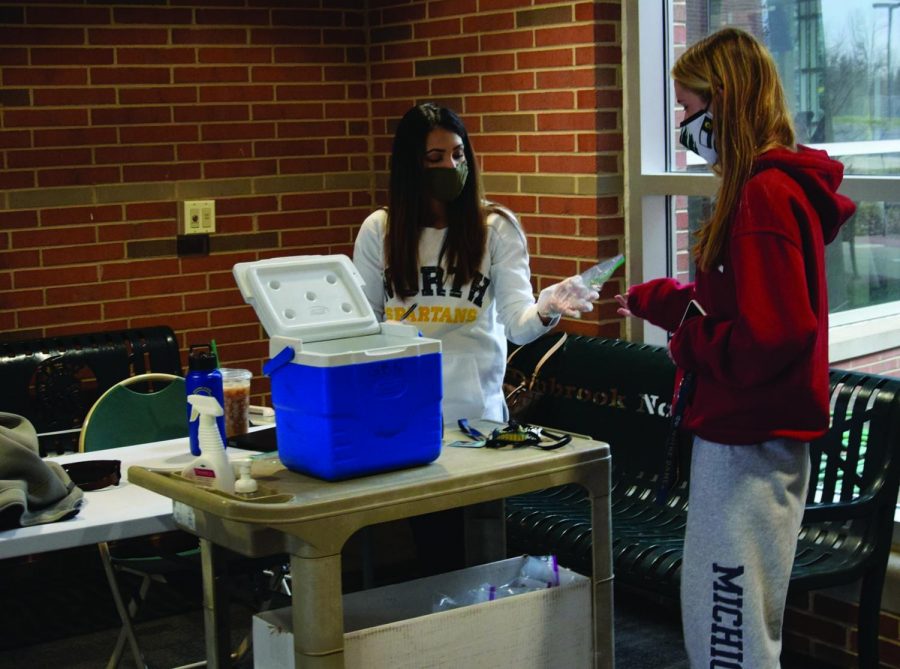District conducts pilot testing program
Athletes, coaches from three teams testing biweekly
As the result of a decision by the Glenbrook High School District #225 School Board on Oct. 26, District #225 is conducting a pilot non-diagnostic COVID-19 testing program for students involved in select extracurricular activities chosen by administrators at Glenbrook North and Glenbrook South.
“Ultimately we decided, let’s move forward with some testing, let’s work out the logistics,” said Assistant Superintendent R.J. Gravel in a video conference. “And the Board approved … us moving forward at a cost not to exceed $125,000.”
The initial intent of the program was to require testing for students participating in high-risk extracurricular activities defined by the school principals, said Gravel. Testing is currently only offered to athletes because athletic programs are the only programs running in person during the Adaptive Pause.
According to John Catalano, assistant principal for athletics, varsity athletes in boys basketball, girls basketball and boys swimming at both GBN and GBS can opt in to one-on-one training three days per week. These winter sports were chosen to be part of the pilot program based on multiple considerations, including how conducive they are to individual training, the number of athletes and coaches involved and the amount of space and equipment available.
Athletes and coaches involved in the training are required to turn in saliva samples to athletic trainers at their respective schools every Tuesday and Friday any time from 11 a.m. to 4 p.m., said Catalano. Each sample tube has a sticker with a bar code corresponding to the athlete or coach’s name, and results are kept confidential.
According to Gravel, the program uses an RT-LAMP saliva test developed by the University of Wisconsin System. The test is a non-diagnostic surveillance test, meaning it is not approved by the FDA as an indicator of positivity but can monitor the spread of COVID-19 through a community. The test can indicate results of clinical significance, indicating the person should receive a diagnostic test, for both asymptomatic and symptomatic carriers.
If an individual’s saliva test produces a result of clinical significance, the district then offers an FDA-authorized, diagnostic RT-PCR test known as the Abbott BinaxNOW test, said Gravel. This portable test, developed by Abbott Laboratories, is a nasal test that can identify whether the recipient is positive within 15 minutes. The district has about 2,000 Abbott BinaxNOW tests provided by the Illinois Department of Public Health.
Each RT-LAMP test costs the district $11, said Gravel. Other options the district considered prior to the University of Wisconsin System test ranged from $20 to over $100 per test.
Lily Denk, a basketball player participating in one-on-one training, said in a phone interview that athletes were notified of the program in a Zoom meeting on Thursday, Dec. 3 and, on the same day, were each offered a kit containing supplies for 30 tests.
According to Gravel, around 150 total people are involved in the pilot testing program. The first samples were collected on Dec. 4, and as of Dec. 14, only one saliva test has received a result of clinical significance.
Gravel thinks the testing program will be expanded to more students and staff, he said. If in-person learning resumes, which is currently scheduled for Jan. 19, testing may be offered regardless of extracurricular involvement.
“Our [goal] in moving forward with this program was to see how we can continue to make our learning environment safe and how, ultimately, we can provide option and flexibility for our families,” said Gravel. “And testing is one of those mitigation efforts that we hope will help us accomplish that goal.”


